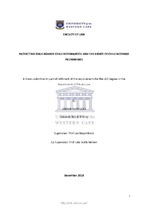| dc.description.abstract | The issue of child motherhood remains a key challenge, especially in developing countries such as Zimbabwe. Despite bearing the worst of its effects, Zimbabwe looks largely to have fallen short of answers to solve this problem. The focus has been on legal solutions to prevent and ban child marriages, which leaves the plight of child mothers and/or motherhood often forgotten. Interestingly, the 2016 landmark case of Mudzuru and another v Minister of Justice, Legal and Parliamentary Affairs which declared child marriages illegal serves as an eye opener to the challenges of how to legally protect child mothers in Zimbabwe. Though dealing with child marriages, the importance of the case is the fact that child marriages are the major contributor of adolescent motherhood in that married girls become predominantly child-bearers.
According to provincial statistics in Zimbabwe, Manicaland and Mashonaland Central provinces have the highest number of child mothers averaging 27 and 30 per cent, respectively. The Zimbabwe Demographic and Health Survey reported that nine out of 10 teens aged 15 to 19 are sexually active, and two out three first have had sex before the age of 15. Therefore, girls are at risk of becoming child mothers, without necessarily being married. Consequently, the need to protect girls from early motherhood, and give effect to the rights of girls who are already child mothers becomes a pressing issue.
Zimbabwe has made several international commitments to the realisation of children’s rights. It is a signatory to the Convention on the Rights of the Child and the African Charter on the Rights and Welfare of the Child, which contain provisions that protect girls against child motherhood and the rights of child mothers. In 2013, Zimbabwe adopted a new Constitution. It espouses a regime of justiciable children’s rights. It has also promulgated subsidiary laws that are also relevant to children’s rights. Therefore, the main purpose of this study is to critically analyse legal and policy measures towards the protection of girls against child motherhood and the rights of child mothers in Zimbabwe. | en_US |

